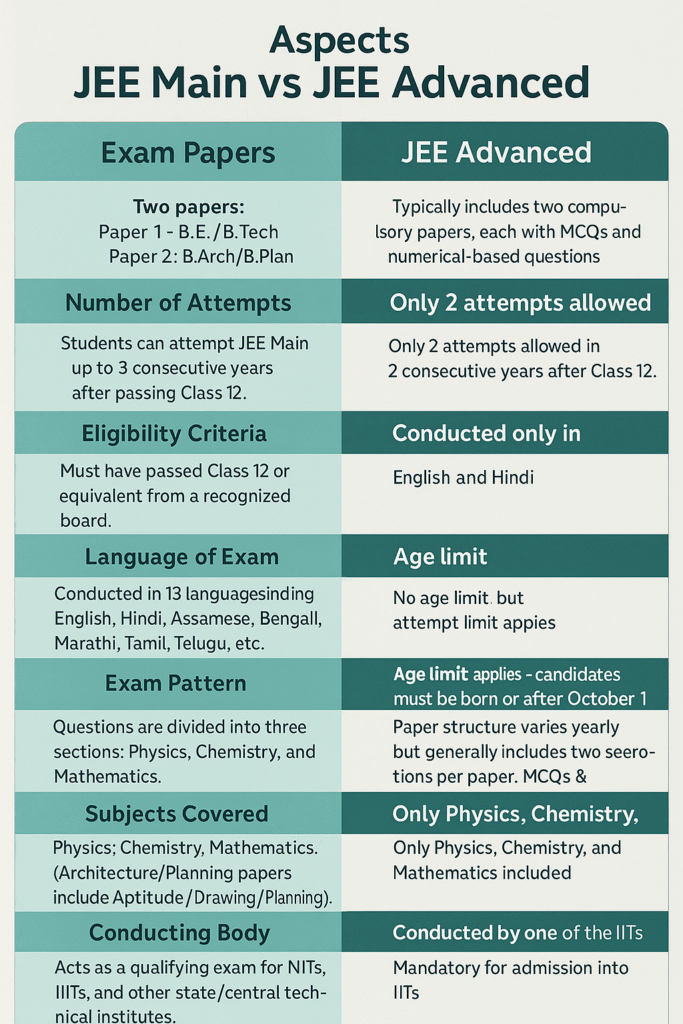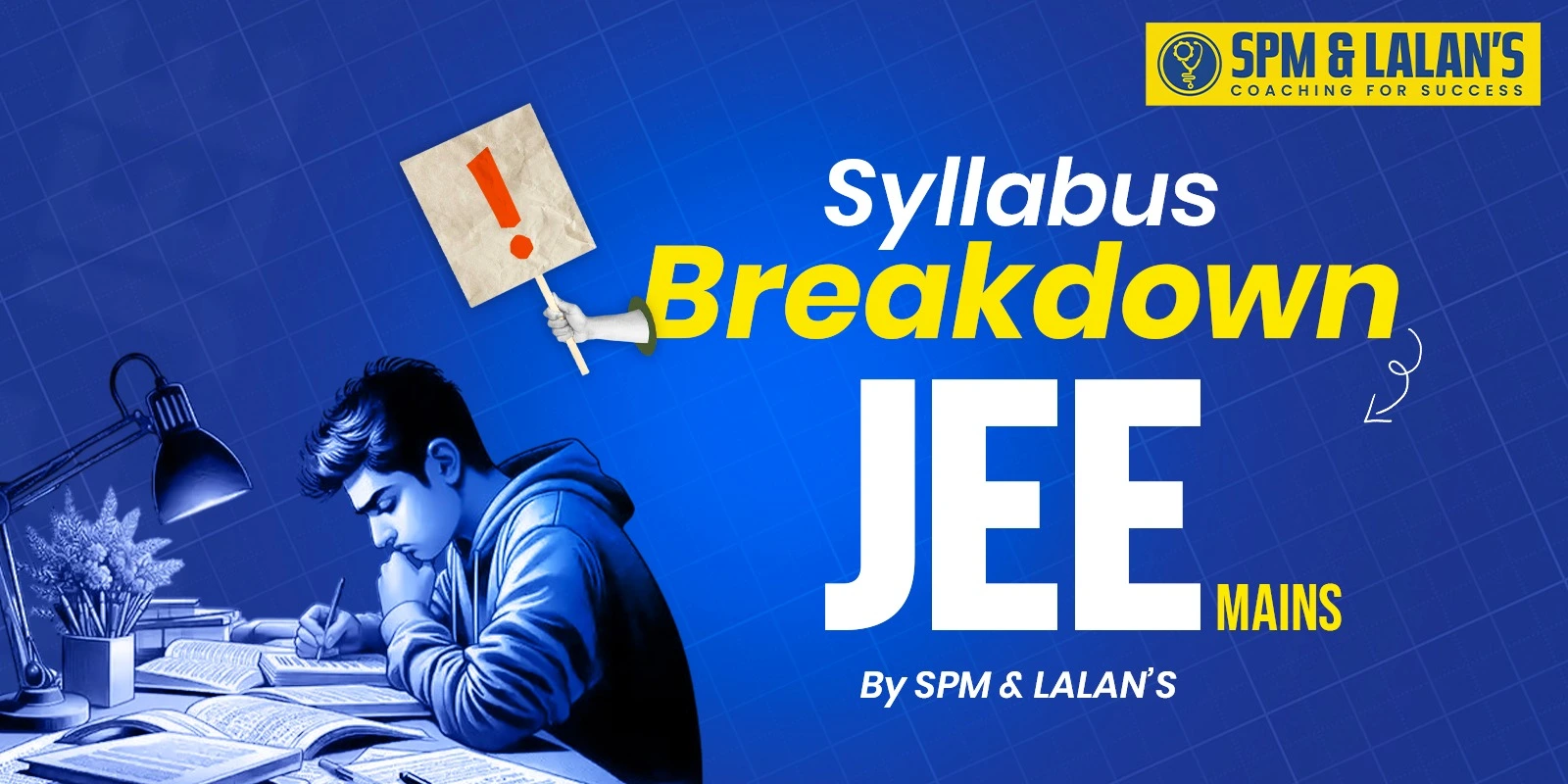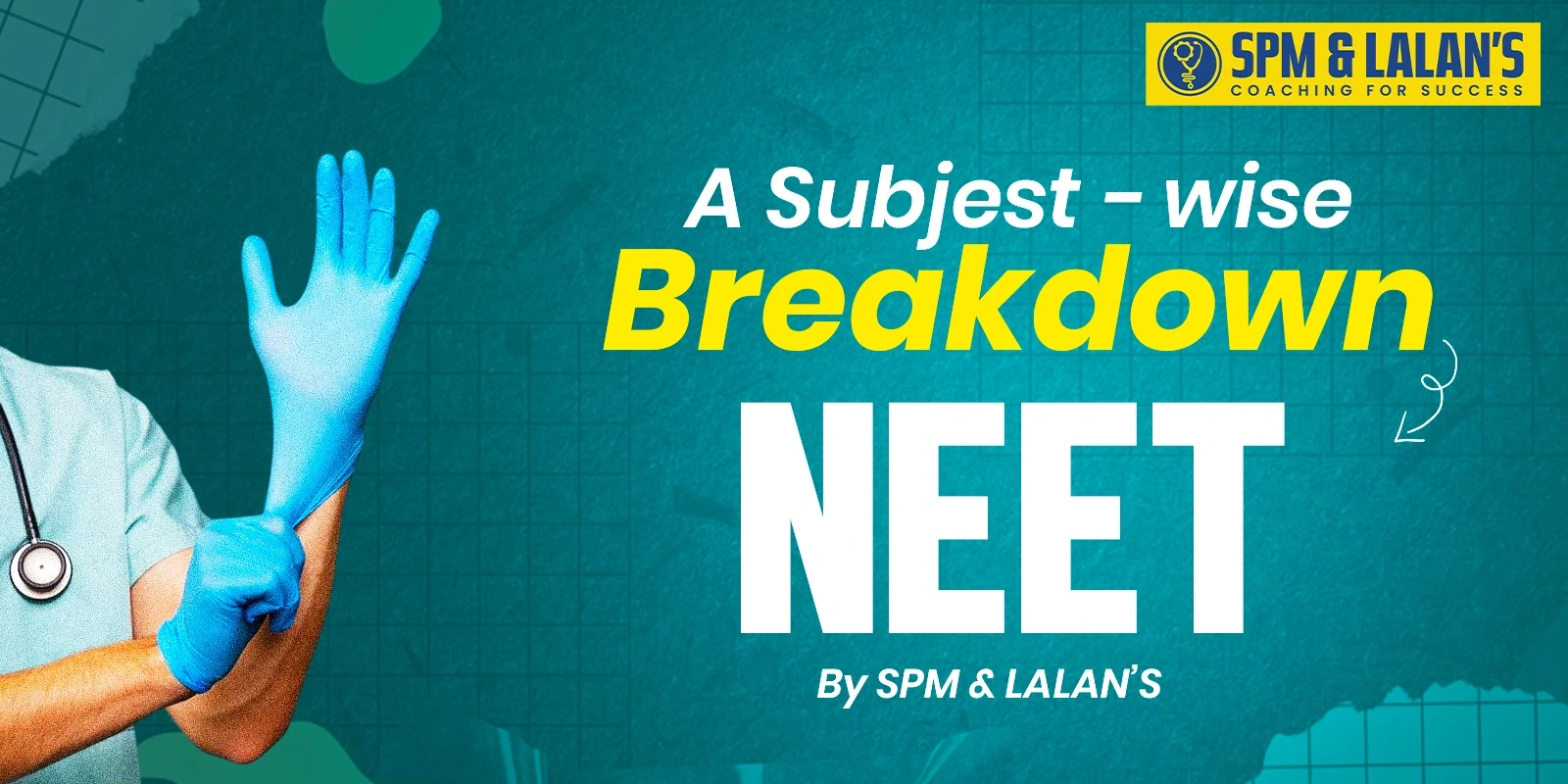Every year, lakhs of engineering aspirants aim to secure seats in India’s top engineering colleges. Two critical steps on this journey are JEE Mains vs JEE Advanced, national-level entrance exams that serve as gateways to prestigious institutions like NITs, IIITs, and IITs. While both exams are interconnected, they serve different purposes and follow distinct patterns. In this blog, we break down the key differences between JEE Main and JEE Advanced from eligibility and exam pattern to difficulty level and career scope—so you can better understand which path leads where in your engineering journey.
What is the difference between JEE MAINs vs JEE ADVANCED?
Following are the key differences between JEE Main and JEE Advanced
| Aspects | JEE Main | JEE Advanced |
| Exam Papers | Two papers:• Paper 1 – B.E./B.Tech• Paper 2 – B.Arch/B.Plan | Typically includes two compulsory papers, each with MCQs and numerical-based questions |
| Number of Attempts | Students can attempt JEE Main up to 3 consecutive years after passing Class 12. | Only 2 attempts allowed in 2 consecutive years after Class 12. |
| Eligibility Criteria | Must have passed Class 12 or equivalent from a recognized board. | Must be among the top 2,50,000 rank holders in JEE Main. |
| Language of Exam | Conducted in 13 languages including English, Hindi, Assamese, Bengali, Marathi, Tamil, Telugu, etc. | Conducted only in English and Hindi. |
| Age Limit | No age limit, but attempt limit applies | Age limit applies – candidates must be born on or after October 1, 2000 (with relaxations for reserved categories). |
| Exam Pattern | Questions are divided into three sections: Physics, Chemistry, and Mathematics. | Paper structure varies yearly but generally includes two sections per paper: MCQs & numerical answers. |
| Subjects Covered | Physics, Chemistry, Mathematics. (Architecture/Planning papers include Aptitude and Drawing/Planning sections.) | Only Physics, Chemistry, and Mathematics are included. |
| Conducting Body | Conducted by the National Testing Agency (NTA). | Conducted by one of the IITs under the guidance of the Joint Admission Board (JAB). |
| Purpose | Acts as a qualifying exam for NITs, IIITs, and other state/central technical institutes. | Mandatory for admission into IITs. |

For more information about JEE Mains and JEE Advanced, can check the official website https://jeemain.nta.nic.in/
JEE Main syllabus 2026
🔹 Physics
- Physics and Measurement
- Kinematics
- Laws of Motion
- Work, Energy and Power
- Rotational Motion
- Gravitation
- Properties of Solids and Liquids
- Thermodynamics
- Kinetic Theory of Gases
- Oscillations and Waves
- Electrostatics
- Current Electricity
- Magnetic Effects of Current and Magnetism
- Electromagnetic Induction and Alternating Currents
- Electromagnetic Waves
- Optics
- Dual Nature of Matter and Radiation
- Atoms and Nuclei
- Electronic Devices
- Communication Systems
- Experimental Skills
🔹 Chemistry
Physical Chemistry
- Some Basic Concepts in Chemistry
- States of Matter
- Atomic Structure
- Chemical Bonding and Molecular Structure
- Chemical Thermodynamics
- Solutions
- Equilibrium
- Redox Reactions
- Electrochemistry
- Chemical Kinetics
- Surface Chemistry
Inorganic Chemistry
- Classification of Elements and Periodicity
- The s-, p-, d-, and f-block Elements
- Coordination Compounds
- Environmental Chemistry
- Hydrogen
- General Principles and Processes of Isolation of Elements
Organic Chemistry
- Basic Principles of Organic Chemistry
- Hydrocarbons (Alkanes, Alkenes, Alkynes)
- Haloalkanes and Haloarenes
- Alcohols, Phenols, and Ethers
- Aldehydes and Ketones
- Carboxylic Acids and Derivatives
- Amines
- Biomolecules
- Polymers
- Chemistry in Everyday Life
- Principles of Practical Organic Chemistry
🔹 Mathematics
- Sets, Relations and Functions
- Complex Numbers and Quadratic Equations
- Matrices and Determinants
- Permutations and Combinations
- Binomial Theorem
- Sequence and Series
- Mathematical Reasoning
- Limits, Continuity and Differentiability
- Integral Calculus
- Differential Equations
- Coordinate Geometry
- Three Dimensional Geometry
- Vector Algebra
- Trigonometry
- Statistics and Probability
JEE Advanced Syllabus 2026
🔹 Physics
- General Physics
- Mechanics
- Thermal Physics
- Oscillations and Waves
- Electricity and Magnetism
- Optics
- Modern Physics
- Electromagnetic Induction
- Electromagnetic Waves
- Photoelectric Effect
- Kirchhoff’s Laws
- Blackbody Radiation
- Compton Effect
- Wien’s Displacement Law
- Stefan’s Law
- Newton’s Law of Cooling
🔹 Chemistry
Physical Chemistry
- Mole Concept
- Atomic Structure
- Chemical Bonding
- Chemical and Ionic Equilibrium
- Chemical Thermodynamics
- Solutions and Colligative Properties
- Electrochemistry
- Surface Chemistry
- Chemical Kinetics
- Solid State
- States of Matter (Gases and Liquids)
Inorganic Chemistry
- Periodic Table and Properties
- Hydrogen
- The s-, p-, d-, and f-block Elements
- Coordination Compounds
- Metallurgy
- Qualitative Analysis
Organic Chemistry
- Basic Principles and Techniques
- Hydrocarbons (Alkanes, Alkenes, Alkynes)
- Aromatic Compounds
- Haloalkanes and Haloarenes
- Alcohols, Phenols, and Ethers
- Aldehydes and Ketones
- Carboxylic Acids and Derivatives
- Amines
- Biomolecules
- Polymers
- Chemistry in Everyday Life
- Reaction Mechanisms
- Stereochemistry
🔹 Mathematics
- Sets, Relations and Functions
- Algebra
- Matrices and Determinants
- Quadratic Equations
- Probability
- Trigonometry
- Vector Algebra
- Three Dimensional Geometry
- Coordinate Geometry
- Limits and Continuity
- Differentiability
- Applications of Derivatives
- Integral Calculus
- Differential Equations
- Statistics
For more detailed syllabus check: JEE MAINS SYLLABUS | JEE ADVANCED SYLLABUS
Understanding the differences between JEE Main and JEE Advanced is crucial for every engineering aspirant. From eligibility criteria, exam patterns, and syllabus, to attempt limits and language options, each exam comes with its own set of requirements and challenges. While JEE Main is the stepping stone toward prestigious institutes like NITs and IIITs, JEE Advanced opens the door to the coveted IITs. By recognizing these distinctions early on, students can plan their preparation strategically and focus on the specific expectations of each exam. If you’re aiming for a future in engineering, now is the time to register, stay focused, and begin your journey with confidence and clarity.
FAQs
1. What are the minimum eligibility criteria to apply for top engineering colleges?
Ans:- To apply for top engineering colleges in 2025, students must secure 75% and 65% for SC/St category.
2. How many times can a candidate appear in the JEE Main examination?
Ans:- Candidates can appear in the JEE main examination for three years in a row. NTA conducts JEE main examination twice a year which means you will have a total of 6 attempts.
3. Which syllabus should the candidate focus on JEE Mains or JEE Advanced?
Ans:- A candidate must qualify the JEE mains examination to appear for the JEE advanced, so the first focus should be on JEE main syllabus, After qualifying the JEE main, they should focus on the JEE advanced.
4. Why is it necessary to solve previous year’s question papers for JEE Advanced preparation?
Ans:- By solving the previous year questions for JEE advanced preparation, students get an insight about the types of questions asked, also understand the exam pattern and improve time management.
5. What is JEE Main and JEE Advanced?
Ans:- JEE Main is the first stage of India’s engineering entrance exams, managed by the NTA, for admission to NITs, IIITs, and other institutions. JEE Advanced, conducted by IITs, is the second stage for students qualifying for JEE Main, enabling entry into IITs.



